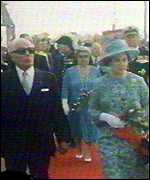| Front Page |
| World |
| UK |
| UK Politics |
| Business |
| Sci/Tech |
| Health |
| Education |
| Entertainment |
| Talking Point |
| In Depth |
| AudioVideo |

He was one of the most consistently pro-Western of all the Arab leaders and was one of the first politicians to call for a negotiated settlement of the Palestinian problem.
Bourguiba is believed to have been born in 1903, though a lack of records and his own reticence on the matter indicate that he might have been much older.
After initially gaining a reputation as a flamboyant provincial lawyer, he also became a prominent figure in the campaign to end French rule over the North Africa colony.
Imprisoned
Paris was unimpressed and Bourguiba was imprisoned in France for a total of 11 years for sedition.
Such was his importance that, following the German occupation of 1940, he was released from prison in an attempt by the Nazis to coax Tunis to the Axis cause.

Bourguiba gave Yasser Arafat's PLO sanctuary
|
During the early years of his rule, Bourguiba found himself heavily involved in supporting the guerrillas, waging a bloody independence struggle in neighbouring Algeria.
Sensitive to popular opinion
For a time, relations with France collapsed and Bourguiba was accused of a loss of judgement. Although he had dictatorial powers under the constitution, Bourguiba was sensitive to popular opinion: Too sensitive, his critics maintained.
Domestically, Bourguiba attempted to modernise his nation. Industry and tourism were encouraged an supported, and oil brought unheard-of prosperity to many Tunisians.

Welcoming The Queen to Tunis, 1980
|
Tunisia, then a one-party state came under pressure, both domestic and external, to move to democracy. In 1977, 50 people were killed during political riots, but Bourguiba's rule was generally peaceful.
In October 1980, The Queen and the Duke of Edinburgh made a state visit to Tunisia. Later that year, President Bourguiba indicated his readiness to move to a multi-party system.
Emancipated Tunisian women
Though a Muslim himself, Mr Bourguiba rejected militant Islam. He gave women the vote and scrapped polygamy and the veil. He balanced his pro-Western stance by giving refuge to the PLO following its expulsion from Lebanon.
The 1980s saw a decline in his political fortunes. Economic difficulties, coupled with a long-running dispute with the country's main trades union, paved the way to his eventual downfall.
In November 1987, in the midst of these crises, Tunisia's Prime Minister, Zine el-Abdine Ben Ali, removed President Bourguiba from office after a team of doctors had pronounced him unfit to rule.

He was forced from power in 1987
|
Habib Bourguiba's time in office saw Tunisia take a mighty leap from the Middle Ages into the 20th Century.
A first-rate diplomat, he neatly balanced Tunisia between Eastern and Western power blocs, rejecting both Communism and, for a time, Western-style democracy.
Mr Bourguiba's charismatic personality held his nation together through difficult times and Tunisia's peaceful political transitions are a fitting comment on his achievements.
| Search BBC News Online |
||
Advanced search options |
||
The BBC is not responsible for the content of external internet sites